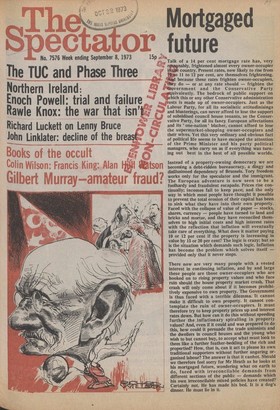Talk of a 14 per cent mortgage rate has, very
rteignably, frightened almost every owner-occupier h'ktetblb country. Present rates, now likely to rise from 11 to 12 per cent, are themselves frightening. baØ because these rates frighten owner-occupiers, bey do — or at any rate should — frighten the rk9vernment and the Conservative Party equivalently. The bedrock of public support on which this or any other Conservative administration rests is made up of owner-occupiers. Just as the Labour Party, for all its socialistic attitudinisings and blusterings, can never afford to lose the support of subsidised council house tenants, so the Conservative Party, for all its fancy European affectations and its 'one-nation' blather, cannot afford to lose the supermarket-shopping owner-occupiers and their wives. Yet this very ordinary and obvious fact of political life seems to have escaped the attention of the Prime Minister and his party political managers, who carry on as if everything was turning out best in the best of all possible worlds.
Instead of a property-owning democracy we are becoming a debt-ridden bureaucracy, a dingy and disillusioned dependency of Brussels. Tory freedom works only for the speculator and the immigrant. The European adventure is now seen to be a foolhardy and fraudulent escapade. Prices rise continually; incomes fail to keep pace; and the only way in which most people have thought it possible to prevent the total erosion of their capital has been to sink what they have into their own property. Faced with the collapse of value of paper — stocks, shares, currency — people have turned to land and bricks and mortar, and they have reconciled themselves to high initial costs and high interest rates with the reflection that inflation will eventually take care of everything. What does it matter paying 10 or 12 per cent if the property is increasing in value by 15 or 20 per cent? The logic is crazy; but so is the situation which demands such logic. Inflation has become the problem which solves itself — provided only that it never stops.
There now are very many people with a vested interest in continuing inflation, and by and large these people are those owner-occupiers who are hooked on to rising property values and who face ruin should the house property market crash. That crash will only come about if it becomes prohibitively expensive to own property. The Government Is thus faced with a terrible dilemma. It cannot make it difficult to own property. It cannot contemplate the ruin of owner-occupiers. It must therefore try to keep property prices up and interest rates down. But how can it do this without speeding further the inflationary spiralling in property values? And, even if it could and was prepared to do this, how could it persuade the trade unionists and the dwellers in council houses and the young who wish to but cannot buy, to accept what must look to them like a further feather-bedding of the rich and propertied? How, that is, can it act to please its own traditional supporters without further angering organised labour? The answer is that it canhot. Should we therefore feel sorry for Mr Heath as he looks at his mortgaged future, wondering what on earth to do, faced with irreconcilable demands from different sections of the public — demands which his own irreconcilable mixed policies have created? Certainly not. He has made his bed. It is a dog's dinner. He must lie in it.


































